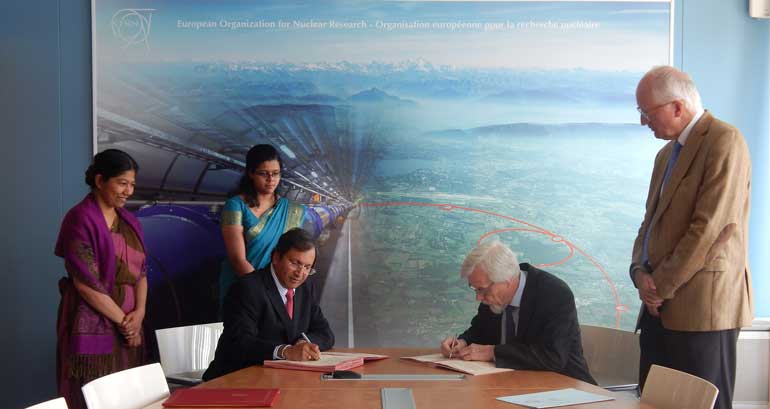Saturday Feb 21, 2026
Saturday Feb 21, 2026
Monday, 29 June 2015 00:00 - - {{hitsCtrl.values.hits}}
 Sri Lanka‘s Permanent Representative to the UN in Geneva Ambassador Ravinatha Aryasinha and the CERN Director General Rolf-Dieter Heurer signed an Expression of Interest Agreement to begin cooperation between CERN and the scientific community in Sri Lanka, on Thursday, 25 June, at the CERN Headquarters in Geneva. CERN International Relations Head Dr. Rüdiger Voss, Sri Lanka Permanent Mission Deputy Permanent Representative Samantha Jayasuriya and Sri Lanka Permanent Mission Second Secretary Dilini Gunasekera were associated with the ceremony
Sri Lanka‘s Permanent Representative to the UN in Geneva Ambassador Ravinatha Aryasinha and the CERN Director General Rolf-Dieter Heurer signed an Expression of Interest Agreement to begin cooperation between CERN and the scientific community in Sri Lanka, on Thursday, 25 June, at the CERN Headquarters in Geneva. CERN International Relations Head Dr. Rüdiger Voss, Sri Lanka Permanent Mission Deputy Permanent Representative Samantha Jayasuriya and Sri Lanka Permanent Mission Second Secretary Dilini Gunasekera were associated with the ceremony
Sri Lanka and the European Organization for Nuclear Research (CERN) have entered into an agreement to begin cooperation between CERN and the scientific community in Sri Lanka.
Sri Lanka’s Permanent Representative to the UN in Geneva Ambassador Ravinatha Aryasinha and CERN Director General Rolf-Dieter Heurer signed an ‘Expression of Interest’ (EOI) Agreement on Thursday, 25 June, at CERN Headquarters in Geneva to give effect to this process.
CERN is the most prominent particle physics research institute in the world and is best known for its flagship discovery of the Higgs-Boson in 2012, conferring the 2013 Nobel Prize for Physics to two theoretical physicists who had predicted this fundamental particle almost 50 years earlier. More than half of the world’s particle physicists – about 11,000 in number coming from over 600 universities in 80 countries – do research at CERN, and are engaged in complex scientific experiments.
The Agreement will facilitate engineers, scientists and researchers from Sri Lankan universities and research institutes to gain valuable first-hand experience and knowledge in both experimental and theoretical particle physics and related aspects of technologies through the highly-demanded programs conducted by CERN.
Sri Lankan students, teachers, scientists, engineers and researchers may also apply on a competitive basis for the CERN’s annual ‘High-School teacher’, ‘Summer Student’ and other training programs. The agreement will also pave the way for an ‘International Cooperation Agreement’, which will enable the development of a networked scientific community of Sri Lankan scholars, who could remain engaged with the research activity carried out by CERN in the field of high energy physics.
As part of an action plan to give effect to this EOI, in a discussion following the signing ceremony, Ambassador Aryasinha and CERN DG Heuer agreed to consider the possibility of two programs in the current year. First, for CERN to conduct a workshop in Colombo for Master Teachers of Physics in order to generate interest at the secondary school level throughout the country. Second, for a group of leading physicists, representing the different universities in Sri Lanka to visit CERN in order to be exposed to the research work currently underway.
CERN International Relations Head Dr. Rüdiger Voss, Sri Lanka Permanent Mission Deputy Permanent Representative Samantha Jayasuriya and Sri Lanka Permanent Mission Second Secretary Dilini Gunasekera were associated in the discussions.
In November 2014, the Permanent Mission in Geneva facilitated a visit to Sri Lanka by Dr. Voss, through the Coordinating Secretariat for Science, Technology and Innovation (COSTI). During his visit, Dr. Voss had discussions with the then Senior Minister for Scientific Affairs, the Minister of Education and the Minister of Technology, Research and Atomic Energy. He also met officials from COSTI, the University Grants Commission and the Atomic Energy Authority, as well as senior scientists.
CERN, which was founded in 1954 through a convention signed by 12 European states, presently has 21 states as members, three associate member states and four observer states. With the signing of the EOI, Sri Lanka became the latest non-member state of CERN to come into an agreement in terms of an Expression of Interest (EOI), and could progressively graduate to enter into an International Cooperation Agreement with CERN, a status already reached by South Asian neighbors Bangladesh, India and Pakistan, who are among the more than 40 countries already collaborating with CERN through such a mechanism.